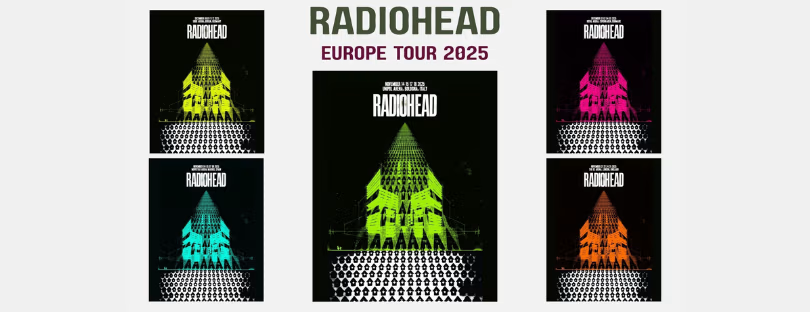
Radiohead’s 2025 European Tour to Generate €12 Million in Tourism Spending — How Locals Are the Real Winners
When Radiohead hits the road this November for its 2025 European Tour, it won’t just be music fans cheering — local economies across Europe are about to get a serious boost. According to new data from Mabrian and The Data Appeal Company (part of Almawave Group), the band’s tour is expected to generate over €12 million in tourism-related spending across its 16 shows.
And here’s the twist: this isn’t your typical tourism windfall driven by hotel stays. Instead, nearly 60% of that spending will pour into food and beverages, with accommodation accounting for less than 20%. In other words, most attendees aren’t flying across continents — they’re hopping on trains, grabbing dinner with friends, and heading home the same night.
It’s a story of local tourism in action — and one that might redefine how major events are managed in Europe’s post-pandemic travel economy.
How the Tour Is Shaping Spending Patterns
The tour stops in Madrid, Bologna, London, and Berlin between November and December, hosting more than 205,000 concertgoers. While that audience may sound modest compared to global mega-festivals, the economic ripple effects are anything but.
- Madrid (Spain): November 4–8 at Movistar Arena
- Bologna (Italy): November 14–18 at Unipol Arena
- London (UK): November 21–25 at The O2
- Berlin (Germany): December 8–12 at Uber Arena
The data from Mabrian and The Data Appeal Company estimates that food and beverage spending alone will account for 59.9% of the total tourism expenditure. Transportation follows with 21.6%, while hospitality brings in 18.5%.
That spending mix paints a clear picture: this is a tour for the fans next door. “The ticket distribution strategy was intentionally designed to prioritise locals and nearby residents,” explains Carlos Cendra, Partner and Marketing Director at Mabrian. “That decision channels fan spending toward restaurants and transportation — boosting small businesses while keeping the event sustainable.”
It’s a clever model, especially as destinations look to host major events without overwhelming local infrastructure.
London: The Heavyweight in Economic Impact
London predictably tops the charts with an estimated €4.2 million in tourism-related spending—almost double that of the other host cities. It’s not just about bigger crowds; it’s also about higher prices.
With the city’s famously steep costs in dining, mobility, and accommodation, the breakdown of spending is telling:
- 59.2% for food and beverages
- 21% for hospitality
- 19.8% for transportation
Essentially, London’s hospitality and restaurant sectors are the biggest winners — a familiar pattern for major concerts at The O2, which often anchor mini-economic booms in the Greenwich area.
Madrid, Bologna, and Berlin: Where Locals Rule the Wallet
Madrid, which opens the tour, will bring in around €2.3 million across its four concerts. The Spanish capital shows the strongest appetite for gastronomy, with 61.6% of total spending going to food and drink. Accommodation takes just under 20%, confirming what the data suggests: this is a largely local affair.
In Berlin, mobility takes the lead — 25.3% of all visitor spending — the highest share of transportation-related expenditure among the four cities. That’s a clear sign that many fans will travel from neighboring regions or even nearby countries. Bologna, similarly, reports 23.2% transportation spending, underlining its strategic role as a hub for Central and Eastern European visitors.
As Cendra points out, “By giving fans from nearby countries such as France, the Netherlands, Austria, or Poland better access to tickets, Radiohead effectively transformed these cities into regional gathering points — not just concert venues.”
Data Meets Tourism Strategy
The findings, released ahead of the World Travel Market (WTM) in London, highlight a growing trend in tourism intelligence: live events are no longer just entertainment — they’re urban micro-economies.
Mabrian and The Data Appeal Company will co-host a panel titled “Unlocking the Tourist Impact of Events” on November 4 at the Crown Plaza Docklands, bringing together experts from tourism boards, event organizers, and data firms to discuss how cities can translate short-term visitor surges into long-term economic value.
“The numbers are impressive,” says Mirko Lalli, CEO of The Data Appeal Company. “But more importantly, they give us a real-time pulse of how major events reshape urban economies. For local governments, this isn’t just data — it’s a planning tool to optimize mobility, public services, and business readiness.”
In essence, this is event intelligence: the idea that destination managers can use live data to manage visitor flows, balance resident satisfaction, and measure sustainability metrics in real time.
What It Means for Europe’s Event Tourism Future
If the Radiohead case study proves anything, it’s that the future of event tourism lies in smarter localization, not mass international arrivals.
By prioritizing nearby markets, organizers can maintain economic impact without overburdening hotels or airports — a lesson learned from years of overtourism debates. It’s also aligned with the growing sustainability expectations among both fans and local governments.
We’re seeing similar data-driven approaches from players like Live Nation and AEG Presents, which are increasingly collaborating with travel intelligence companies to measure their environmental and economic footprints. Meanwhile, destinations like Barcelona and Amsterdam are tightening event permits to favor those that show community benefit rather than tourist overload.
The takeaway? Radiohead’s tour could set a precedent. Not because it’s the biggest — but because it’s the smartest.
As WTTC and ETC have both emphasized in recent reports, the future of tourism is about value, not volume. And if you can get 200,000 people to spend €12 million without a single overcrowded hotel? That’s a hit every destination should want on its setlist.









